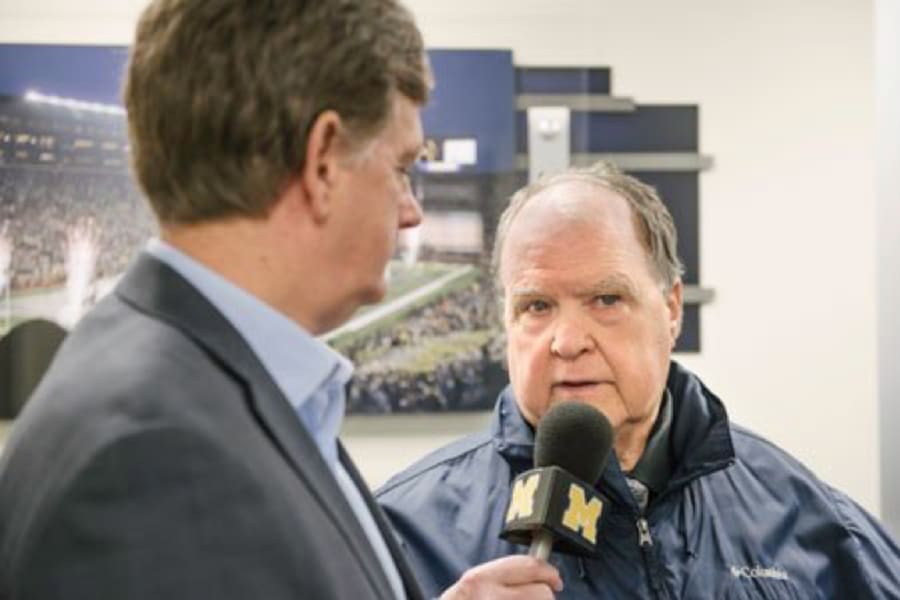Sitting in a swimming pool in Florida in 2017, Al Randall Higgins was doing what most radio announcers might do while escaping Michigan winters — they check the neck for infections like strep throat. If they feel swollen lymph nodes, they make a mad dash for a Z-pack of antibiotics.
The first round didn’t work. Second round didn’t work. The doctor sent a camera down Higgins’ throat for a better look. Then he took a deep breath and told Higgins, who had been the radio voice of Michigan hockey for 25 years, that a biopsy would determine if he had oropharyngeal cancer.
Higgins had it. And it had metastasized from the base of the tongue to a lymph node in his neck.
The goal: Kill the cancer, save the voice.
Higgins’ doctor referred him to the Henry Ford Cancer Institute, where his colleague from the University of Johns Hopkins Medical School was now the internationally known director of the Head and Neck Program, Dr. Steven S. Chang.
Surgery wasn’t the best option for Higgins.
“He wanted to make sure there was no risk for any changes to his voice, accent or intonation,” Chang said. “Even though this was a very surgically amenable cancer, we tailored the treatment to his lifestyle and needs, empowering the patient in the decision-making process.”
Higgins’ treatment plans were based on Henry Ford’s multidisciplinary care approach. He met with a radiation oncologist, speech and swallow specialist, dietitian and psychologist. Early and extensive support was available through Henry Ford’s survivors clinic.
The tumor wouldn’t be removed surgically. It would be irradiated in 35 treatments — five per week — and he would receive three rounds of chemotherapy.
But first things first. Higgins wanted to postpone treatment until hockey season ended.

Seven weeks later, his wife Cindy and friends began a rotation on the “Randall Express,” driving daily from DeWitt, just north of Lansing, to Henry Ford in Detroit — 202 miles round trip.
To avoid damage to Higgins’ voice box, Dr. Farzan Siddiqui, PhD., and the director of Head and Neck Radiation Oncology at Henry Ford, used intensity modulated radiation therapy, and Dr. Jawad Sheqwara, a Henry Ford medical oncologist, did the chemotherapy.
“The treatment was the hardest thing I ever did in my life,” Higgins said.
Most of the side effects happened within a month after treatment. No saliva, no taste, no ability to talk or eat or swallow. Sleeping was tough. A recliner chair became his bed. Eventually, medicinal cocktails numbed his throat, and he was finally be able to get some food down.
“They warn you that the side effects can be a nightmare,” Higgins said.
He admits he didn’t initially take the medicinal cocktails so he could eat. “I didn’t pay attention to details.”

After radiation, taste usually returns in three months and dry mouth often reverses within a year, Siddiqui said.
Weakened by dehydration, lack of food and sleep, Higgins wanted to give up.
“I had to tell myself to keep going. Without my wife Cindy, my faith and my family, I would have never made it. We prayed a lot about getting through this,” Higgins said. “I felt God’s spirit was moving us toward recovery with the help of doctors.
“Eventually you feel a little better. Then a little more. Then all of a sudden, you’re a heck of a lot better. Finally, you’re looking at the experience in your rearview mirror.”
In December 2019, Higgins had his sixth clean scan for the cancer that has an 85-90% survival rate.
“I’ve always been a fighter. My parents molded me to take a punch and keep going. You’ll get knocked down, but you have to get up,” Higgins said.
When he’s not calling hockey games for the University of Michigan, he doubles as the co-owner of a windshield glass business in Lansing.

To fighters, survivors and their caregivers, he said, “Everybody has that extra something in them that will come out when you need it. Keep pushing yourself every day. If you pray to be strong, you will be stronger. Stay close to friends and family, and they’ll get you through it.”
“You have to find your purpose in life. I want to live to help other people,” said Higgins, who volunteers to drive cancer patients to their appointments.
Higgins called games in the UM’s 2019-2020 hockey season using the same voice he’s had all his life — but with a heck of a lot more gratitude.
